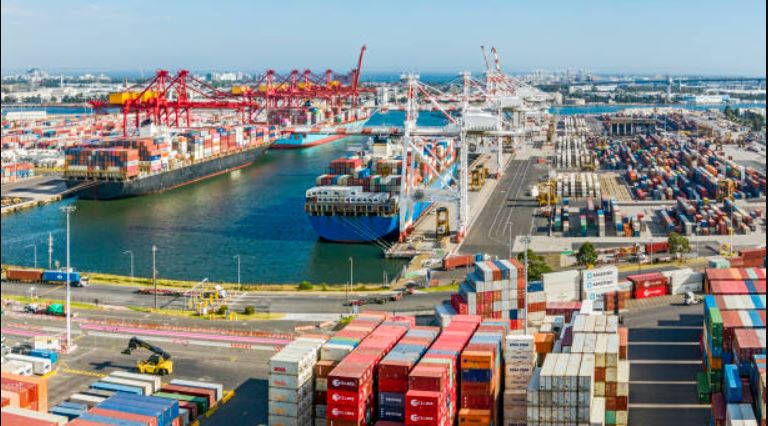Are you interested in the most developed states in Nigeria by HDI? The Human Development Index (HDI) is a helpful tool to see which Nigerian states have the best living conditions.
This guide lists the top 10 most developed Nigerian states based on the latest 2024 HDI data. And, you will learn about some of the factors that contribute to a high HDI score, giving you a deeper understanding of development across the country.
READ ALSO: Who Built ASO Rock?
Which Are The Top 10 Most Developed States In Nigeria?
Here’s a table of the top 10 most developed states In Nigeria by HDI, according to the 2023 report:
Rank | State | HDI Score (2023) |
|---|---|---|
1 | Lagos | 0.79 |
2 | Abuja | 0.77 |
3 | Anambra | 0.75 |
4 | Rivers | 0.74 |
5 | Delta | 0.73 |
6 | Akwa Ibom | 0.72 |
7 | Ogun | 0.71 |
8 | Edo | 0.70 |
9 | Oyo | 0.69 |
10 | Enugu | 0.68 |
READ ALSO: Where Is Olumo Rock Exactly Located?
1. Lagos: 0.79
In Nigeria, Lagos State has the highest Human Development Index (HDI) at 0.79. Economically, Lagos is a powerhouse, ranking as one of the fastest-growing urban areas globally.
It hosts Nigeria’s most populous city and is a strong financial center, with one of Africa’s largest economies, valued at $84 billion. This places it on par with the GDPs of countries like Ghana, Angola, and Ethiopia.
Also, Lagos is an essential hub for culture, education, and transportation in Nigeria and Sub-Saharan Africa. Despite challenges such as overcrowding and severe traffic congestion, Lagos State continues to thrive with numerous developmental projects underway.
The state government is launching ambitious infrastructure initiatives like the Fourth Mainland Bridge, a 38 km long project set to become the second longest bridge in Africa.
Moreover, transportation infrastructure is a key focus, with initiatives like the Lagos Bus Rapid Transit System and the recently launched Lagos State Rail Mass Transit system.
Lagos State is also recognized for its vibrant culture, bustling markets, and significant economic activities. Its literacy rate is the highest in Nigeria, underscoring its commitment to education and human development.
2. Abuja: 0.77
Abuja is one of the most developed cities In Nigeria with the highest Human Development Index (HDI) of 0.77. Abuja’s economy thrives on real estate, with substantial investments from both local and foreign sources.
This sector is a major source of employment, contributing to the city’s growth. Annually, Abuja hosts the Abuja International Trade Fair to promote trade links and business opportunities.
The city is efficiently connected via the Nnamdi Azikiwe International Airport, facilitating both domestic and international travel. Highway networks like the A2 expressway link Abuja with neighboring states to improve regional connectivity.
The planned Lagos–Kano Standard Gauge Railway passes through Abuja, with completed segments servicing routes to Kaduna.
Also, the city briefly operated a light rail system, the first in Nigeria and Western Africa, providing rapid transit. However, the system was suspended due to the COVID-19 pandemic and faced criticism for low ridership.
READ ALSO: Politicians Who Have Been Senate Presidents in Nigeria Till Date
3. Anambra: 0.75
Anambra State also has the highest Human Development Index (HDI) in Nigeria, standing at 0.75. Agriculture plays an important role in its economy, with crops like oil palms, maize, rice, yams, and cassava being cultivated.
Fishing is also a major, especially in riverine areas. Besides, Anambra is home to Nigeria’s first vehicle manufacturer, Innoson, located in Nnewi.
Onitsha, a major trading hub, attracts people from across West Africa, supporting the state’s internal revenue and commercial prowess. The state capital, Awka, is a center for Nigeria’s metalwork and carving industries.
Anambra’s promoting Innovation is clear by inventions like the machine that removes the bitterness from bitter leaf to enhance vegetable farming productivity.
The export of agricultural goods, such as washed bitter leaf, contributes to the state’s revenue. Anambra is also rich in natural resources, including oil and gas.
The Anambra Basin holds significant untapped reserves, with indigenous companies like Orient Petroleum leading exploration efforts.
The state has also seen strides in infrastructure, with projects like the Niger Bridge and Anambra International Cargo Airport enhancing transportation links.
However, rapid urbanization poses challenges like inadequate infrastructure and environmental degradation, prompting the government to implement long-term plans for sustainable growth.
4. Rivers: 0.74
Rivers State, with a Human Development Index (HDI) of 0.74, is one of Nigeria’s most developed regions. Known historically as a major economic hub, Rivers State continues to play a big part in the nation’s wealth.
In 2021, it ranked 2nd nationwide in gross domestic product (GDP) with $51.529 billion and a per capita income of $5,949 (PPP).
Rich in natural resources, the state has extensive reserves of crude oil and natural gas, contributing over 60% of Nigeria’s oil output.
Additionally, agriculture remains a major source, with the state being a leading producer of yam, cassava, and other crops. Infrastructure in Rivers State is well-developed, particularly in energy and transportation.
With a refining capacity, the state leads in oil processing, and its energy consumption per capita is among the highest in Nigeria.
Transportation networks, including roads, waterways, and airports, facilitate both domestic and international trade. The Port Harcourt International Airport is also a key transport hub that connects the state to various global destinations.
However, challenges persist, such as insufficient energy production leading to frequent power outages and the need for further investment in renewable energy like solar power. Access to clean water remains a concern, with many residents relying on vendors or untreated sources.
READ ALSO: Who Is The Deputy Senate President Of Nigeria
5. Delta: 0.73
One of the states in Nigeria with the highest Human Development Index (HDI) is Delta State, with an HDI of 0.73. Delta State is one of the richer and more developed states in Nigeria.
It has the second-lowest incidence of extreme poverty, with only around 3% of the population living in extreme poverty, contrasting with the national average of 31%, as per World Bank data from 2018.
Delta State is rich in natural resources, including different solid mineral deposits such as industrial clay, silica, lignite, kaolin, tar sand, limestone, and more.
These minerals serve as raw materials for a range of industries, including brickmaking, ceramics, glass manufacturing, and chemical production, among others.
However, these resources are not fully utilized, presenting opportunities for further economic development. Besides, Delta State is a major player in Nigeria’s petroleum industry, with substantial deposits of crude oil.
It ranks among the largest producers of petroleum products in the country, and sales of petroleum products are a primary driver of its economy.
6. Akwa Ibom: 0.72
Akwa Ibom State is one of the most progressive states In Nigeria with one of the highest Human Development Index (HDI) in the country, 0.72. This index mirrors the overall well-being and development of its people.
The state’s economy primarily revolves around the production of crude oil and natural gas, making it the leading oil producer in Nigeria.
However, despite its abundant oil revenues, Akwa Ibom faces challenges in changing this wealth into improved infrastructure, education, and welfare for its citizens.
In addition to its oil industry, Akwa Ibom also engages in agriculture, with notable cultivation of crops such as cocoyam, yam, and plantain. Fishing and heliciculture (snail farming) are also notable industries in the state.
Despite these economic activities, systemic corruption has hindered the effective utilization of resources for the betterment of the population. The state comprises oil-producing Local Government Areas such as Ibeno, Mbo, and Eastern Obolo.
7. Ogun: 0.71
Ogun State is recognized as one of Nigeria’s most developed areas, with a low incidence of extreme poverty, affecting only around 5% of its population, compared to the national average of 31% (World Bank, 2018).
Dubbed the “Gateway to Nigeria,” Ogun is well-known for its industrial, hosting industrial estates and serving as a major manufacturing hub in the country.
Notable factories include the Dangote Cement factory in Ibese, Nestle, Lafarge Cement factory in Ewekoro, and Procter & Gamble in Agbara, among others.
The state’s economy flourishes in various sectors, with mining and agriculture playing an important part. Ogun is the largest producer of kolanut in Nigeria and harvests various crops like grain, rice, maize, cassava, and more.
The state is a major center for metalworking, named after the Yoruba god of metalworking, Ogún.
It hosts manufacturing plants for armored vehicles and drones.
Ogun State benefits from its proximity to Lagos and its transportation infrastructure, including the Lagos-Abeokuta-Ibadan standard rail link and planned expressways.
8. Edo: 0.70
Another Nigerian state with the highest Human Development Index (HDI) is Edo state. It is one of the most developed states In the country, with Tourist attractions including the Emotan Statue in Benin City.
Nature lovers can explore the serene beauty of Ise Lake and River Niger Beach in Agenebode, Etsako-East, or visit the scenic River Niger Beaches at Ilushi. The state also has cultural landmarks such as the Igun Bronze Caster at Igun Street in Benin City.
For those interested in outdoor adventures, Edo State offers opportunities to hike through picturesque landscapes, including the hills of Okpekpe and Usomege Hills at Apana-Uzairue.
Additionally, visitors can examine the Somorika hills in Akoko Edo, where a government-run tourist center at Ososo provides access to stunning scenery.
Economically, Edo State benefits from its natural resources, including crude oil, limestone, and quarry. Industrial activities such as cement production at Okpella contribute to the state’s economic growth.
9. Oyo: 0.69
Oyo State, with a Human Development Index (HDI) of 0.69, is one of the most developed Nigerian states, and agriculture is the primary occupation for its residents.
This state benefits from the favorable climate that supports the cultivation of various crops like maize, yam, cassava, millet, rice, plantains, cocoa, palm produce, and cashews.
The state hosts numerous government farm settlements in areas such as Iseyin/Ipapo, Ilora, Eruwa, Ogbomosho, Iresaadu, Ijaiye, Akufo, and Lalupon. Then again, Oyo is rich in natural resources, including clay, kaolin, and aquamarine.
It has vast cattle ranches located in Saki, Fasola, and Ibadan, along with a dairy farm at Monatan in Ibadan. Also, the statewide Oyo State Agricultural Development Programme, headquartered in Saki, promotes agricultural growth and development across the state.
Oyo is also home to various international and federal agricultural establishments which has contributed to its agriculture and overall development.
READ ALSO: The History of Military Rule in Nigeria
10. Enugu: 0.68
Enugu State is also considered one of Nigeria’s most developed states. Despite its rural and agrarian economic profile, the state has a mixed economic landscape.
Agriculture forms the backbone of its economy, with a significant portion of the population engaged in farming. Trading and services also play a part, especially in urban areas, where trading is the dominant occupation followed by services.
The state is home to several vibrant markets, including the Ogbete Main market in the capital city of Enugu and the Orie Orba Market, one of the largest grains markets in the region.
Like every other state, Enugu State is rich in natural resources, including coal, lead, zinc, limestone, and traces of crude oil. Electricity supply is relatively stable, with the Oji River Power Station located within the state.
With the deregulation of electricity generation in Nigeria, there are opportunities for private investment in power generation and coal mining.
The coal industry, in particular, has historically been a major employer of labor in the state, and efforts are underway to attract investors to revitalize this sector.
Reference Sources:

